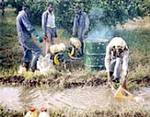 全球公民社會6日於阿拉伯杜拜之國際會議中倡議一項名為「國際化學管理之策略途徑」(SAICM)的新行動,目的在使化學製品對人體及地球環境更具安全性。此自願性協議包含了一系列方案,例如化學品風險管理,以及對廢棄或庫存化學品採用統一的標示等等。此外,此協議乃是由與會之政府、化學工業、商會、工會與其他公民社會團體所共同達成。
全球公民社會6日於阿拉伯杜拜之國際會議中倡議一項名為「國際化學管理之策略途徑」(SAICM)的新行動,目的在使化學製品對人體及地球環境更具安全性。此自願性協議包含了一系列方案,例如化學品風險管理,以及對廢棄或庫存化學品採用統一的標示等等。此外,此協議乃是由與會之政府、化學工業、商會、工會與其他公民社會團體所共同達成。
在這次「國際化學管理研討會」會議中,來自各國的100多位環境、衛生首長一致通過上述決議。此一決議是為了實現2002年世界永續發展高峰會上各國許下的承諾,以更好的方式使用、製造化學品,以降低其對人體及環境的負面影響。
聯合國環境規劃署執行長托佛(Klaus Toepfer)表示:「我很樂見各國政府能通過這項新的化學品管理方案,我真心相信這是重要的一步,我們使用及製造化學品的方式將因此而改變。在現代社會中,所有種類的化學品均具有重要角色,尤其是在克服貧窮與邁向永續發展方面。」
托佛也強調其他配套措施,如適當的金融措施、針對發展中國家的能力強化計畫、更多的技術支援,並且要迅速而有效的啟動SAICM,搭配以預警原則的運用。
目前全球市場上有7萬到10萬種化學品,估計每年就有1,500種新的化學品上市。在國際社會通過SAICM的此時,預期全球化學品產量將在未來15年內再增加80%,而製造化學品的重鎮也將從先進國家轉移到發展中國家。
A new global initiative aimed at making chemicals safer for people and the planet was agreed Monday at an international conference in Dubai. The agreement was reached with participation from governments, the chemical industry, business, trade unions and other civil society groups. Called the Strategic Approach to International Chemicals Management, or SAICM, the new voluntary initiative covers a range of measures from risk assessments of chemicals and harmonized labeling to tackling obsolete and stockpiled products.
Adopted by more than 100 environment and health ministers at the International Conference on Chemicals Management, the initiative fulfills a commitment made at the World Summit on Sustainable Development in 2002 to use and produce chemicals in ways that minimize adverse effects to health and the environment.
UNEP Executive Director Klaus Toepfer said, "I am delighted that governments could agree to this new chemicals initiative which I sincerely believe will be a step change in the way we use and produce chemicals. All kinds of chemicals are vital in the modern world. They have a key role in overcoming poverty and delivering sustainable development."
Toepfer stressed the need for adequate financing, improved capacity building in developing countries, increased technological support, a quick and effective start to SAICM implementation, and use of the precautionary approach.
Between 70,000 and 100,000 chemicals may be already on the market with an estimated 1,500 new ones being marketed each year. SAICM comes at a time when global chemical production is projected to climb by 80 percent over the next 15 years, and chemical production is shifting from the developed to the developing world.



